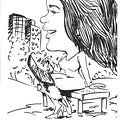Member-only story
What’s at Stake
Y’all Need To Vote. Black Women Can’t Do It Alone.
This important voting bloc is ready to drive seismic change
ZORA has delved into what’s at stake in this election cycle with an important series about women of color and the vote. We sought the insight of political activists, advocacy groups, lawmakers, and community stakeholders. Read on for insight into a voting bloc that may impact not just the next election, but America’s future course. Keep an eye on What’s at Stake all week long.
Nykidra “Nyki” Robinson saw her hometown, Baltimore, erupt in unrest following the police-involved death of Freddie Gray back in 2015. That same year, Robinson launched Black Girls Vote, which mobilizes Black women to use their collective voting power.
As November’s general election fast approaches, the team at Black Girls Vote is busy registering voters. The nonprofit has also launched Party at the Mailbox, which sends custom boxes to voters in Baltimore, Detroit, and Philadelphia. Each box contains voter information, a window sign, a poster, a T-shirt, and more.
“For many people, their mailbox is now their ballot box,” says Robinson. “Even if they don’t vote by mail, we want to make sure Black women vote in this election and feel empowered.”

